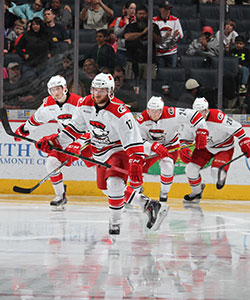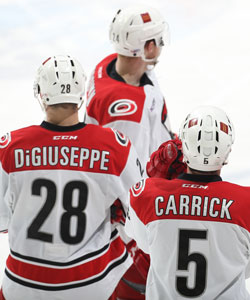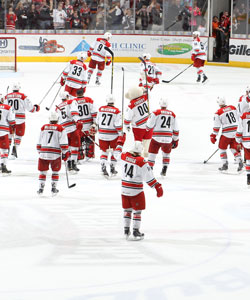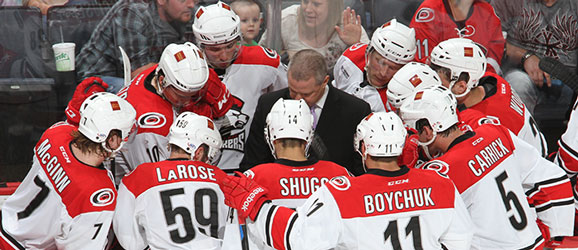Seven months later, it appears that question has been answered, though not in a way the team had hoped.
Only a season-high, seven-goal outburst in their final game of the season saved the Checkers from the possibility of finishing last in the league in offense – an area that, more often than not, was the reason for their inability to finish higher than 13th in the Western Conference and mount a serious challenge at a playoff spot. For the most part, other important areas for success were there, including defense, goaltending and the willingness to battle every night, but the goal support never came with any kind of consistency.
Take into account that the Checkers scored two goals or fewer in 47 of their 76 games this season, including a franchise-record-tying six times shut out, and went 8-32-7 in those games. Consider that they finished tied for 28th in the league in goals scored with an average of 2.26 per game and had the league’s 28th-ranked power play at 13.7 percent, the latter of which came despite a drastic turn for the better in the second half. Note that the Checkers were one of four teams to have just one player break the 40-point mark (Justin Shugg had 43).

“Scoring was a big issue,” coach Jeff Daniels acknowledged. “I did a quick count the other day, and I think of our 38 losses, in 26 of those games we either scored one or zero goals. It’s tough to win games when you’re only scoring one goal because every goal against gets a little magnified.”
Why were goals so hard to come by? Most of it can be attributed to the makeup of the roster, which, with a few exceptions, contained grittier players that project to be bottom-six forwards at the NHL level.
Thrust into top-six roles in Charlotte, many did an admirable job of scratching and clawing their way to whatever goals they could get. They simply did not come naturally the way they did to a Boychuk or a Terry. Daniels pointed out that many forwards set new career highs in terms of their offensive totals, though at the end of the day those were still quite modest. Shugg (22), top newcomer Chad LaRose (20) and McGinn (15) were the only players to hit 15 goals.
“You’re asking a lot of guys to have career years but also double what they’re capable of doing,” said Daniels. “When we needed that big goal or the power play had a chance to win the game or tie the game, we just couldn’t find a way to do it.”
Because of the lack of depth in that department, every injury or recall to Carolina hurt a little more than it might have in previous years.
“In the summertime you put the roster together and Rask was a guy we thought would probably be down here and play a top-line role, play on the power play and kill penalties,” said Daniels. “Sure enough, to his credit, right from Traverse City he made a statement that he was ready for the next level.”
“Nemo’s injury really hurt us,” goaltender Drew MacIntyre said of Nemisz, who paced the team with 14 points in 21 games until an early-December knee injury. “That guy was playing amazing and was our best player at the time. I just told him that if he had stayed healthy, our games near the end would have been a lot more meaningful. He’s a heck of an all-around player.”
Having to make do without the usual array of top guns is part of why Daniels rarely seemed to lose patience with his team despite the results, which did not come at first (2-6-0 in October) and only improved marginally over time (9-9-1 in March and April).

Many players looked at losing close games as the reason for the team’s untimely end to the season. Truth be told, the Checkers actually did relatively well in tight contests, going 18-8-7 in one-goal games and 7-7-0 in two-goal games. There were just so many of them and wins were so hard to come by that every such loss was harder to take. With the team’s inability to make up for it in other areas, the rare lapses in work ethic were also magnified (eight losses by four or more goals).
Others looked at the inability to put together the kind of winning streaks that could have gotten them back into contention. By the time February rolled around, they had won consecutive games on only one occasion, a two-game sweep of Milwaukee in late November. They went on to put together a pair of three-game streaks after that, but nothing that approached a significant push for the playoffs.
Of all the things that players and coaches cited after the fact, one common factor implied by some and directly stated by others was the team’s youth. After a core group of veterans like LaRose, MacIntyre, Ben Holmstrom and Kyle Hagel, there were a franchise-record six rookies who spent the majority of the season in Charlotte.
“We were just too young. Flat out,” said MacIntyre, one of three players 30 or older (LaRose and Hagel) by season’s end. “I think everybody knew that coming into it. Anybody that looked at our lineup was going to know that we were going to have our ups and downs. When you make a lineup like that, I don’t think anybody was shocked. I think we did better than expected.”
“We didn’t have too much experience in certain roles and that undoubtedly affected us,” said second-year defenseman Danny Biega, who was the only non-rookie on the Checkers’ blue line for a game against Rockford on April 11. “A lot of guys gained a lot of experience, but we needed guys with more experience if we wanted to have a more successful season.”
Throughout the season, Daniels was careful to avoid putting too much pressure on his younger players, acknowledging that he often had to give them too much responsibility too soon.
“They got a great opportunity, and hopefully they understand what they need to improve on and work on,” said Daniels. “Hopefully in the long run and the big picture it benefits those players and the team, but I think it was an eye opener for those guys.

That three rookies – Carrick, Di Giuseppe and McGinn – ended up in the team’s top six in terms of scoring speaks in part to the team’s roster makeup but also to those players’ abilities to be productive for long stretches.
“I thought a lot of our young guys stepped up huge and made a lot of strides, but they need veteran guys that can have that kind of healthy competition on a team,” said MacIntyre. “A lot of them kind of walked into a first-line role and a second-line role, and that’s tough. They are going to be that type of player sooner rather than later, but you need those veteran guys to fill the void.”
Whether those additions come next season or not, the Checkers’ core of entry-level players already has some serious ice time under its belt relative to that of its peers. Whereas the team was careful with placing expectations on those players this season, that changes now.
“The message was pretty clear for the young guys – now you take the next step,” said Daniels. “A lot of those guys had good first years, but now they can’t be satisfied and content. Take the game to the next level by getting to the pro level conditioning-wise.
“For the guys that got a chance to play some NHL games, that doesn’t make a career. You’ve had a taste of it, now you should want more. (The Hurricanes) want to see improvement by working on your game throughout the summer. Don’t be satisfied.”





